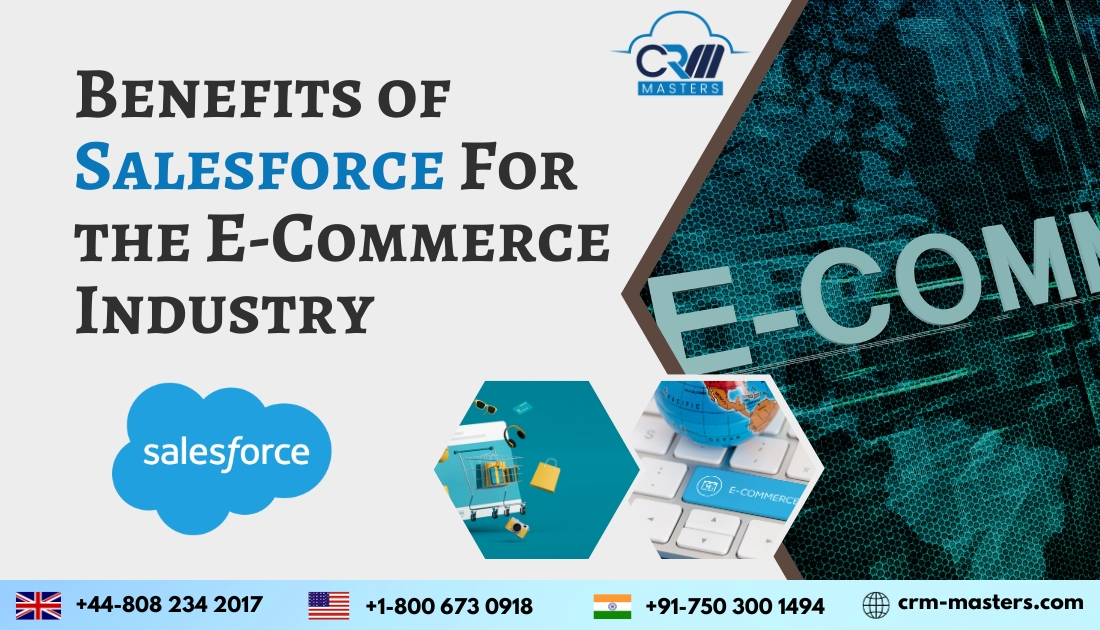
Important Features and Benefits of Salesforce For the E-Commerce Industry
E-commerce has changed how the world does business, and the industry has grown so much over time. The evolving industry has also increased the demand for robust and adaptable solutions. Salesforce appears to be one of the transformative forces empowering the e-commerce industry with a comprehensive suite of tools for enhancing every aspect of business operations. Salesforce steps into this role with many features that redefine customer relationship management (CRM) for the digital age.
E-commerce enterprises struggle with vast amounts of customer data from various sources, and Salesforce provides the means to consolidate this information into a singular, actionable view. This consolidated perspective becomes the bedrock for personalised marketing strategies, targeted promotions, and a heightened understanding of customer behaviour.
Streamlined tools for order tracking, supply chain management, and inventory management. Salesforce goes beyond conventional CRM by seamlessly integrating with diverse third-party applications, ensuring a cohesive ecosystem where data flows and adaptability in the ever-evolving e-commerce landscape.
We will learn how Salesforce is a catalyst for success in e-commerce by learning features and benefits.
Top Benefits of Salesforce for Retail & E-Commerce
Unified Customer View

One key feature that makes Salesforce essential for e-commerce businesses is its ability to provide a unified view of the customer. Salesforce integrates customer data from various sources, including website interactions, social media, and purchase history. Salesforce Customer 360 is a platform that provides a unified view of the customer by consolidating data from various sources, including Salesforce Commerce Cloud, Marketing Cloud, and Service Cloud. It enables businesses to create a comprehensive customer profile, allowing for a 360-degree view that includes purchase history, interactions, and preferences.
Personalised Marketing with AI

Salesforce leverages artificial intelligence (AI) through its Einstein platform to enable personalised marketing at scale. AI-driven insights help e-commerce businesses analyse customer data to predict buying patterns, preferences, and trends. Salesforce Marketing Cloud facilitates personalised marketing campaigns across multiple channels. It harnesses AI to analyse customer behaviour and preferences when integrated with Einstein Analytics. This combination enables businesses to create targeted, AI-driven marketing campaigns that resonate with individual customers.
Efficient Inventory Management

For e-commerce businesses, efficient inventory management is crucial to ensure products are available when customers want them. Salesforce provides advanced inventory management features that help businesses track stock levels, manage warehouses, and streamline order fulfilment processes. Salesforce Commerce Cloud includes inventory management, order fulfilment, and supply chain optimisation features. It allows businesses to manage their product catalogues efficiently, track inventory levels in real-time, and streamline order processes.
Customer Service Excellence

In the e-commerce industry, exceptional customer service is a key differentiator. Salesforce’s Service Cloud is designed to streamline customer support operations, providing a unified platform for managing inquiries, complaints, and service requests. The platform’s case management system ensures customer issues are efficiently tracked, prioritised, and resolved. Integrating customer service data with the overall customer profile allows businesses to offer personalised support, anticipate needs, and deliver timely solutions.
Real-time Analytics and Reporting

Salesforce’s Analytics Cloud equips e-commerce businesses with powerful real-time data analysis and reporting tools. With customisable dashboards and reports, businesses can gain insights into sales performance, customer behaviour, and marketing effectiveness. This data-driven approach enables informed decision-making, allowing businesses to identify trends, optimise strategies, and capitalise on emerging opportunities. Monitoring key performance indicators in real time is invaluable for e-commerce businesses striving for agility and competitiveness in the market.
Community Building and Collaboration

E-commerce success extends beyond transactions; it involves building a community of loyal customers and fostering stakeholder collaboration. Salesforce Community Cloud enables businesses to create online communities where customers can interact with each other, share experiences, and provide valuable feedback. Additionally, the platform facilitates collaboration with partners, suppliers, and employees, creating a unified ecosystem. This community-centric approach enhances brand loyalty, encourages user-generated content, and strengthens the overall online presence of e-commerce businesses.
Top 5 Features of Using Salesforce in the E-Commerce Industry
Streamlined Operations through Automation
Salesforce facilitates operational efficiency by automating routine tasks like order processing and inventory updates. Automation reduces errors, accelerates processes, and allows teams to focus on strategic areas such as refining marketing strategies and enhancing customer experiences.
Creative Product Presentation for Engagement
Businesses can leverage innovative tools within Salesforce Commerce Cloud to creatively present products. Dynamic catalogues, AI-driven recommendations, and personalised storefronts enhance the shopping experience, attract customers, and increase opportunities for cross-selling and upselling.
Scalable Cloud Architecture
Salesforce’s cloud-based architecture ensures adaptability and scalability for e-commerce businesses. This flexibility enables companies to scale resources based on demand, stay agile in response to market changes, and readily integrate new technologies into their operations.
Collaboration and Community Building
Salesforce Community Cloud fosters collaboration by providing a platform for interacting with customers, partners, and employees. Online communities allow customers to share experiences, provide feedback, and assist each other, while collaboration with partners and suppliers strengthens the overall business ecosystem.
Data-Driven Insights for Informed Decision-Making
Salesforce Einstein Analytics empowers e-commerce businesses with advanced analytics and predictive insights. Data-driven decision-making becomes a cornerstone for success, enabling businesses to optimise inventory, fine-tune marketing campaigns, and predict customer preferences in real time.
Conclusion
Salesforce has emerged as a technology for the e-commerce industry, offering a comprehensive suite of features and benefits that empower businesses to thrive in the digital era. As the industry continues to evolve, leveraging the power of Salesforce can be a strategic move for businesses aiming to stay competitive, deliver exceptional customer experiences, and drive sustainable growth in the dynamic world of e-commerce.
CRM Masters as a Salesforce Implementation Partner can help your business reach new heights. We guide you through the process with years of experience, and our professional developers












